
Plastic. You can find it everywhere—from a store check-out to the side of the road. From inside our bodies in the form of microplastics we consume to the Great Pacific Garbage Patch, an island of trash with a surface area of 1.6 million square kilometers, which is twice the size of Texas.
How can we work to cut ties with plastics and reduce plastic waste? There are four actions you can follow, Refuse, Reduce, Reuse, and Recycle. You can start practicing these actions during the 2024 Plastic Free Ecochallenge. The Alachua County Library District is partnering with Santa Fe College Teaching Zoo to promote reducing plastic use, and you can participate with us.
What is the 2024 Plastic Free Ecochallenge?
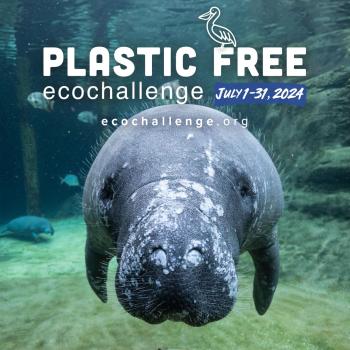
The 2024 Plastic Free Ecochallenge is a 31-day international challenge to raise awareness about the problems with plastics and to provide opportunities to learn about reducing the use and refusing plastics wherever possible in one's life.
First, you need to join the Santa Fe College Teaching Zoo Zero Wasters team. Next, you choose an Action that you can commit to doing throughout the challenge and prepare for it. The Ecochallenge provides a list of Action Categories with numerous activities to try out in the kitchen, the bathroom, the bedroom, in your studies, with your family and friends, and with your community. Once you have signed up and chosen an Action, then complete your Action throughout the month of July and share your story when you are complete. Each challenge category has a variety of actions, from watching videos, writing letters, changing daily behaviors, or simply pledging to pick up trash. The goal is to turn these actions into habits and create a more sustainable lifestyle.
- Only 9% of all plastic created is recycled.
- 2 million plastic bags are used every minute worldwide.
- The average person will eat 70,000 microplastics each year.
- Over the last 50 years, world plastic production has doubled.
- On average a plastic bag is only used once, for about 12 minutes.
- About 70% of litter found on beaches worldwide, is plastic.
Using the Library District can help you to reduce your waste consumption. Rather than purchasing a new book, you can borrow books from your local library. The average paperback book has the same carbon footprint as driving about seven miles in an average car. Utilizing borrowing services and eResources that the Library District provides for free is a way you can start reducing your environmental impact. The Library District has a material holding of more than 900,000 items just waiting to be checked out. All you need is a Library Card.
You can find several Action items in the Ecochallenge that you can complete just by using your local library, including the Borrowed Books challenge, Learn about Plastic Production challenge, and Plastic History Buff challenge.
If you are a craft-loving person, you can learn to make "plarn"—plastic yarn—from single-use shopping bags to crochet reusable bags, mats, and more.
Instructions:
- Flatten the plastic bag and fold it twice longways.
- Cut off the bag's handles and bottom.
- Cut into desired widths. The thicker the cut, the larger the crochet hook it will require.
- Unfold the cut widths into clean loops.
- Thread the end of one loop through the center of another, then thread that end back through its own center. Pull gently until a knot is formed.
- Repeat Step 5 for as long as you desire for your project.
- You have successfully made plarn! Try different hook sizes until you can comfortably crochet the material, then make whatever you like!
Another way to reduce your use of plastics to read eBooks and eAudiobooks. You can download the Libby App to access eBooks and eAudiobooks on your Apple or Android smart device. If you prefer to read on a larger device, go to www.aclib.us/LibbyApp for the browser options.
Don't see your favorite sustainability book or author in this list or our collection? Suggest materials to add to our catalog.
Read More

Total Garbage: How We Can Fix Our Waste and Heal Our World by Edward Humes
An investigative narrative that dives into the waste embedded in our daily lives—and shows how individuals and communities are making a real difference for health, prosperity, quality of life, and the fight against climate change, by a Pulitzer Prize-winning journalist
What happens to our trash? Why are our oceans filling with plastic? Do we really waste 40% of our food and 65% of our energy? Waste is truly our biggest problem, and solving our inherent trashiness can fix our economy, our energy costs, our traffic jams, and help slow climate change—all while making us healthier, happier and more prosperous. This story-driven and in-depth exploration of the pervasive yet hard-to-see wastefulness that permeates our daily lives illuminates the ways in which we've been duped into accepting absolutely insane levels of waste as normal. Total Garbage also tells the story of individuals and communities who are finding the way back from waste, and showing us that our choices truly matter and make a difference.
Our big environmental challenges – climate, energy, plastic pollution, deforestation, toxic emissions—are often framed as problems too big for any one person to solve. Too big even for hope. But when viewed as symptoms of a single greater problem—the epic levels of trash and waste we produce daily—the way forward is clear. Waste is the one problem individuals can positively impact—and not just on the planet, but also on our wallets, our health, and national and energy security. The challenge is seeing our epic wastefulness clearly.
Total Garbage will shine a light on the absurdity of the systems that all of us use daily and take for granted—and it will help both individuals and communities make meaningful changes toward better lives and a cleaner, greener world.
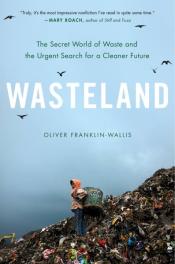
Wasteland: The Secret World of Waste and the Search for a Cleaner Future by Oliver Franklin-Wallis
An award-winning investigative journalist takes a deep dive into the global waste crisis, exposing the hidden world that enables our modern economy—and finds out the dirty truth behind a simple what really happens to what we throw away?
In Wasteland, journalist Oliver Franklin-Wallis takes us on a shocking journey inside the waste industry—the secretive multi-billion dollar world that underpins the modern economy, quietly profiting from what we leave behind. In India, he meets the waste-pickers on the front line of the plastic crisis. In the UK, he journeys down sewers to confront our oldest—and newest—waste crisis, and comes face-to-face with nuclear waste. In Ghana, he follows the after-life of our technology and explores the global export network that results in goodwill donations clogging African landfills. From an incinerator to an Oklahoma ghost-town, Franklin-Wallis travels in search of the people and companies that really handle waste—and on the way, meets the innovators and campaigners pushing for a cleaner and less wasteful future.
With this mesmerizing, thought-provoking, and occasionally terrifying investigation, Oliver Franklin-Wallis tells a new story of humanity based on what we leave behind, and along the way, he shares a blueprint for building a healthier, more sustainable world—before we’re all buried in trash.
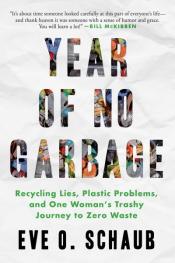
Year of No Garbage: Recycling Lies, Plastic Problems, and One Woman's Trashy Journey to Zero Waste by Eve O. Schaub
In this book Eve O. Schaub, humorist and stunt memoirist extraordinaire, tackles her most difficult challenge to date: garbage. Convincing her husband and two daughters to go along with her, Schaub attempts the seemingly impossible: living in the modern world without creating any trash at all. For an entire year. And—as it turns out—during a pandemic.
In the process, Schaub learns some startling things: that modern recycling is broken, and single-stream recycling is a lie. That flushable wipes aren’t flushable and compostables aren’t compostable. That plastic drives climate change, fosters racism, and is poisoning the environment and our bodies at alarming rates, as microplastics are being found everywhere, from the top of Mount Everest to the placenta of unborn babies.
If you’ve ever thought twice about that plastic straw in your drink, you’re gonna want to read this book.
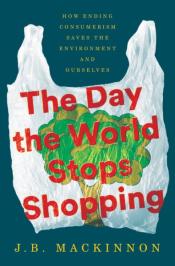
The Day the World Stops Shopping: How Ending Consumerism Saves the Environment and Ourselves by J. B. MacKinnon
We can’t stop shopping. And yet we must. This is the consumer dilemma.
The economy says we must always consume even the slightest drop in spending leads to widespread unemployment, bankruptcy, and home foreclosure.
The planet says we consume too much: in America, we burn the earth’s resources at a rate five times faster than it can regenerate. And despite efforts to “green” our consumption—by recycling, increasing energy efficiency, or using solar power—we have yet to see a decline in global carbon emissions.
Addressing this paradox head-on, acclaimed journalist J. B. MacKinnon asks, What would really happen if we simply stopped shopping? Is there a way to reduce our consumption to earth-saving levels without triggering economic collapse? At first this question took him around the world, seeking answers from America’s big-box stores to the hunter-gatherer cultures of Namibia to communities in Ecuador that consume at an exactly sustainable rate. Then the thought experiment came shockingly the coronavirus brought shopping to a halt, and MacKinnon’s ideas were tested in real time.
Drawing from experts in fields ranging from climate change to economics, MacKinnon investigates how living with less would change our planet, our society, and ourselves. Along the way, he reveals just how much we stand to An investment in our physical and emotional wellness. The pleasure of caring for our possessions. Closer relationships with our natural world and one another. Imaginative and inspiring, The Day the World Stops Shopping will embolden you to envision another way.
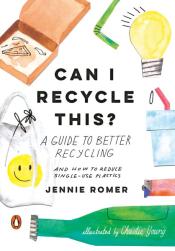
Can I Recycle This?: A Guide to Better Recycling and How to Reduce Single-Use Plastics by Jennie Romer and Christie Young
The first illustrated guidebook that answers the age-old question: Can I Recycle This?
Since the dawn of the recycling system, men and women the world over have stood by their bins, holding an everyday object, wondering, can I recycle this? This simple question reaches into our concern for the environment, the care we take to keep our homes and our communities clean, and how we interact with our local government. Recycling rules seem to differ in every municipality, with exceptions and caveats at every turn, leaving the average American scratching her head at the simple act of throwing something away. Taking readers on a quick but informative tour of how recycling actually works (setting aside the propaganda we were all taught as kids), Can I Recycle This gives straightforward answers to whether dozens of common household objects can or cannot be recycled, as well as the information you need to make that decision for anything else you encounter.
Jennie Romer has been working for years to help cities and states across America better deal with the waste we produce, helping draft meaningful legislation to help communities better process their waste and produce less of it in the first place. She has distilled her years of experience into this non-judgmental, easy-to-use guide that will change the way you think about what you throw away and how you do it.
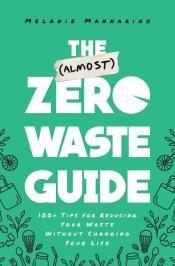
The (Almost) Zero Waste Guide: 100+ Tips for Reducing Your Waste Without Changing Your Life by Melanie Mannarino
Cut back on waste, reduce your carbon footprint, and live more sustainably with these 100 (almost) zero-waste tips
In a perfect world, we would all be able to fit a year’s worth of waste in a mason jar. But for most of us, doing so can be immensely intimidating or simply not feasible.
But even if you can’t be perfectly zero waste, you can still have a profound impact on our environment, climate, and health by making some simple changes to your lifestyle and habits. Author Melanie Mannarino shares 100 simple tips for being less wasteful in a variety of
- At Home, with advice not only for the kitchen and food, but also for cleaning and home organization
- Travel, from commuting to vacations
- Fashion, including finding sustainable brands and caring for your clothing
- Community, helping you identify ways to make a broader impact beyond your home
Beyond limiting your personal waste, learn about how you can reduce your “unseen” waste by making more eco-friendly choices, such as purchasing clothes with more sustainable fabrics and adopting a “Meatless Monday” regimen to help decrease your carbon footprint.
If you’re someone who wants to reduce waste in your daily life and make a positive impact on the planet without making drastic changes in your habits, then look no further. This highly accessible and practical guide will have you living a greener, more sustainable life that is (almost) zero waste in no time!
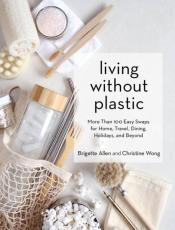
Living Without Plastic: More Than 100 Easy Swaps for Home, Travel, Dining, Holidays, and Beyond by Brigette Allen and Christine Wong
Embrace a plastic-free lifestyle with more than 100 simple, stylish swaps for everything from pens and toothbrushes to disposable bottles and the 5 trillion plastic bags we use—and throw out—every year.
- Use a natural loofah, not a synthetic sponge
- Buy milk in glass bottles or make homemade nut milk
- Opt for a waste-free shampoo bar
- Skip the printed receipt and opt for an email instead
- Wrap gifts beautifully with cloth
Organized into five sections—At Home, Food & Drink, Health & Beauty, On the Go, and Special Occasions—Living Without Plastic is a cover-to-cover collection of doable, difference-making solutions, including a 30-Day Plastic Detox Program.